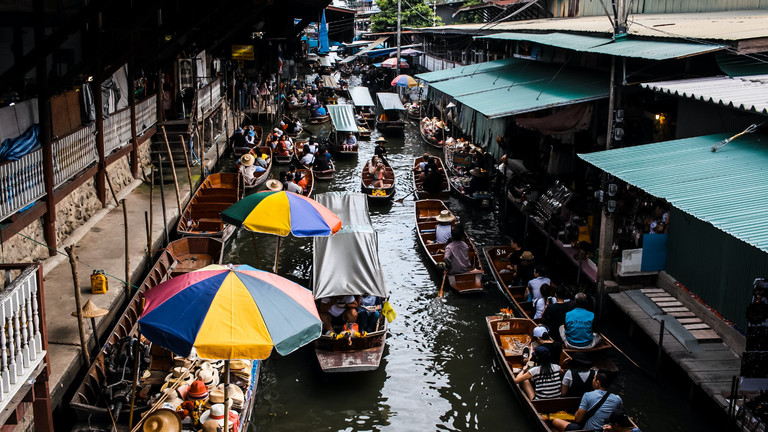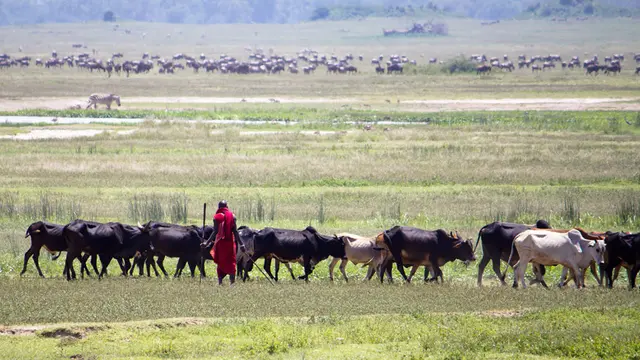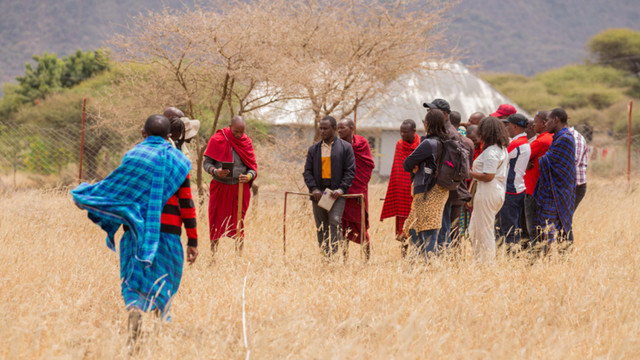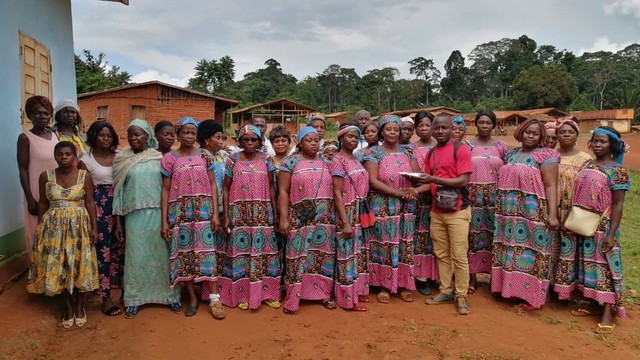CBA17: local solutions inspiring global action
CBA17 brought together practitioners, grassroots representatives, local and national government planners, policymakers and donors working at all levels and scales to discuss how we can drive ambition for a climate-resilient future.

Heavy water traffic in Bangkok, Thailand (Photo: Frida Aguilar Estrada on Unsplash)

The 17th International Conference on Community-Based Adaptation to Climate Change (CBA17) took place from 22-25 May 2023 in Bangkok, Thailand.
For the first time since 2019 CBA was held in-person, with a focus on networking and reconnecting. It offered participants four days of discussion, debate, peer-to-peer ‘skill-shares’ and knowledge exchange.
The CBA conference series aims to bring together a community of practitioners who are collectively seeking to reimagine solutions that enable transformative outcomes, through the agency of communities driving climate action.
CBA is a space for the adaptation community of practitioners to come together to share how to put the principles for locally led adaptation (LLA) into practice, recognising the complexities, innovations and challenges that must be overcome.
CBA events have always been a space for learning and sharing experiences, with a focus on acquiring new skills. The conferences offer an innovative, dynamic and interactive space, enabling participants from the CBA network to promote climate action.
CBA strives to host inclusive, accessible events that enable all individuals to engage fully. We welcomed and encouraged participation from Deaf and disabled individuals.
The CBA17 agenda
The five themes within the CBA17 agenda are listed in the box below. Click on each theme title to see a description.
Nature-based solutions (NbS) are increasingly relied on to adapt to climate impacts, delivering biodiversity conservation and sustainable development such as ‘farming with nature’, ‘green infrastructure’ and ‘healthy landscapes’. But nature-based solutions are often overlooked, especially in urban settings.
What is their potential to reduce vulnerability, enhance livelihoods and nurture wellbeing to climate impacts? With new agreements from COP27 and COP15, the moment to explore the links between climate adaptation and natural systems has never been more urgent.
This theme explored how NbS can deliver effective adaptation: what these solutions look like, how they work, how they can be scaled up, how to create positive linkages between rural and urban communities, and what policy blocks and opportunities exist. We heard about transformative examples of NbS in practice – what's been learned in rural and urban spaces.
Too often, finance does not reach the local level where it’s needed most due to power asymmetries between providers and recipients of finance, alongside inscrutable procedural requirements and a wide range of other challenges. The impact is this sidelining of local solutions, local community engagement and a reduction in the amount of funding actually reaching the local level. Local actors end up bearing the burden of risk, further reinforcing the problems and undermining locally led adaptation.
This theme brought together diverse actors working at different scales to explore innovative approaches for improving direct access to finance for local actors. We heard about decolonised approaches that are flexible, long term and that share risks fairly between donors, intermediaries and recipients. We explored how climate finance can be transparent and fair, creating the conditions for scaled-up, locally led adaptation. Experiences from the sessions were collated in a call to action urging finance providers to take swift action in providing finance towards tried and tested approaches that enable locally led adaptation.
Young people have been championing entrepreneurial, policy and other innovations in urban and rural spaces to drive locally led adaptation. In the Sahel, young people are creating frameworks to restore degraded lands and soil biodiversity. In Southeast Asia, youth initiatives are building community resilience through innovative waste management. However, young people still face many constraints to their full participation in shaping the future.
In this theme, we learned how young people are overcoming barriers and building successful youth-led climate action. We explored questions such as how young people (particularly in the global South) can access/mobilise finance for their initiatives.
How can youth solutions benefit vulnerable communities and be inclusive? And how can young people translate global and national commitments into local actions, and vice versa? Case studies provided opportunities to explore ‘real-life’ examples.
Small and medium enterprises (SMEs) including from the informal sector are crucial players in delivering adaptation at the local level, with potential to scale. This theme examined innovation for adaptation – either led by or directly engaging the private sector to design and deliver adaptation solutions that work for vulnerable communities. We discussed innovative business models that have been successfully developed to deliver solutions locally not only in the technology space, but also in policy, governance or finance.
What are the processes for facilitating and delivering innovation for adaptation successfully within and across formal and informal sectors? Can they learn from and support each other, and if so, how? Where are we seeing new innovations emerging? Who should be financing innovation for adaptation? What partnerships are needed? How can innovation be scaled? What do adaptation actors need to understand about innovation to apply it successfully, at scale, and in support of locally led adaptation?
Power imbalances between donors, recipients and communities continue to shape climate and development approaches today, continuing long-standing, hierarchical colonial relations. Meaningful localisation continues to move at a slow pace and climate solutions do not address the structural causes of vulnerability. The Independent Panel on Climate Change has warned of ‘climate colonialism’ as a driver of vulnerability.
This thought-provoking theme hosted sessions that facilitated uncomfortable but vital conversations on climate colonialism. How have we reached this point? What do colonial and decolonised approaches look like? And what is needed to decolonise adaptation in its language, policy and practice?
CBA conferences reflect our commitment to innovative and dynamic formats with an agenda that actively engages participants and promotes dialogue and interaction, challenging participants to think outside the box.
Participant-led connection is what makes CBA different. The issues discussed were crowdsourced from the attendees and the participants designed and led different elements of the agenda.
Thematic workshops encouraged dialogue, debate and interaction, and avoided unidirectional presentations and panels (in particular, all-white, male 'manels'). Creative and innovative formats and tools helped participants to understand the perspectives of others, seek practical solutions and consider different scenarios.
Skill-shares matched delegates with specific skills with those seeking to acquire or strengthen their competence and knowledge. These peer-to-peer skill-shares encouraged participants to consider and recognise that their on-the-ground experience is valuable and of interest to others – regardless of being 'trainers' themselves.
Practitioners shared the practical tools and approaches they have been using to generate effective action. Our skill-shares let participants contribute their experiences and discuss what they have learned with their peers – people in similar contexts working on similar issues across the world.
The Dragons’ Den – develop and test a funding pitch
One of the highlights of our training offer was Dragons’ Den, a learning programme for would-be local climate leaders that has led former participants to establish their own projects with real local impact.
Participants worked together in teams to collectively develop bids for investment and present these to a group of people with donor or investment experience. These experts (the ‘dragons’) assess the merits and viability of the pitches and provide feedback to the teams in a final, competition-style plenary session. ('Dragons' Den' is a popular TV programme in which the investors are the 'dragons'.)
Previously, the teams were supported by our partners from Global Resilience Partnership (GRP) and IUCN NL with practical planning tools and mentoring. Ideas can be as diverse as an urban waste management project (the Dragons’ Den winner at CBA13), a community-based fund supporting women’s livelihoods (CBA14’s winner) or a project to generate biogas from waste (CBA15's winner).
At the CBA Marketplace, participants became 'stall holders', sharing tools or approaches they have developed as well as lessons and insights from their experience (failures and successes), and set out good-practice narratives that showcase innovation and lived experience.
CBA17 showcased a series of short videos and films that highlighted issues relevant to community-based adaptation, and there was an Open Space area for 'burning issues and big ideas' that hadn't been addressed elsewhere.
What makes the CBA conference different?
It's the only one of its kind for practitioners
The conference prioritises the lived experience, evidence and perspectives of those working directly to deliver community-based climate adaptation, including community, research and local and national government representatives. Practitioners make the programme, working together to articulate their knowledge, learning and experiences to others.
It creates evidence that informs action
Donors and large adaptation programmes come to CBA to find out directly from the practitioners what works and what doesn’t. As Nathanial Matthews, CEO of the Global Resilience Partnership (GRP), said: “CBA is a central event for GRP. It provides us with a consolidated opportunity to collaborate with community leaders and to understand adaptation issues from a wide range of perspectives that informs the best use of our resources from policy through to practice."
It puts community at the centre
CBA is the only adaptation conference that puts the lived experiences and knowledge of local people at the centre – creating a space that enables the voices of the most vulnerable to shape decisions about the future of adaptation.
Sushila Pandit, CBA programming co-chairWhen joining CBA it feels like it’s a forum where everybody can talk; we don’t only listen to experts and seniors but even the frontline workers, even people who just started their career or volunteers. Everyone has a voice here and can express their experience and questions freely.
Through knowledge sharing and influencing global processes and platforms for adaptation, CBA ensures that the perspectives of people on the frontline are heard at the highest levels. The conference is a space to explore the importance and urgency of locally led adaptation and other burning issues.
Participation, networking and interaction like no other
CBA is one of the few places where practitioners can build a South-South network, strengthen their relationships and connect with like-minded practitioners and experts. The interactive sessions, open spaces for sharing skills, dedicated meeting and networking space and collegiate atmosphere brought participants together on an equal footing, regardless of their background or formal level of education.
Your voice expands and grows beyond the conference
The conference was designed to ensure that practitioner voices are heard. Participants included delegates from a wide range of institutions including the UNFCCC, Least Developed Countries (LDC) Group, climate finance funders and LDC government ministries.
Representatives from processes that are shaping policy and practice on adaptation globally, such as the Global Commission on Adaptation or the LDC Initiative for Effective Adaptation and Resilience join CBA conferences to understand practitioner perspectives more deeply. The locally led adaptation principles have been shaped by our community of practice.
Our outreach spans continents and scales; our messages are taken to high-level platforms and global summits including the UN Secretary-General's Summit, the biodiversity and climate COPs and many others – driving real grassroots-led change.
Contact and updates
If you have any questions, please email cbaconference@iied.org.
Sign up to receive updates on CBA and the latest news on CBA17.
About the organisers
CBA17 was organised by host partners the Bill & Melinda Gates Foundation, the International Institute for Environment and Development (IIED), the Global Resilience Partnership, the Asian Disaster Preparedness Center, the World Bank, Practical Action and the Green Africa Youth Organisation, in collaboration with contributing partners Raks Thai, ACTADE, Climate-KIC, ICCCAD, SDI Kenya, VSO, the Adaptation Research Alliance, the Climate Justice Resilience Fund, and CARE.
If you’d like to become a CBA partner, please get in touch with Teresa Sarroca at IIED via teresa.sarroca@iied.org.
Host partners
Contributing partners
Contact
For all enquiries, please contact cbaconference@iied.org.
















